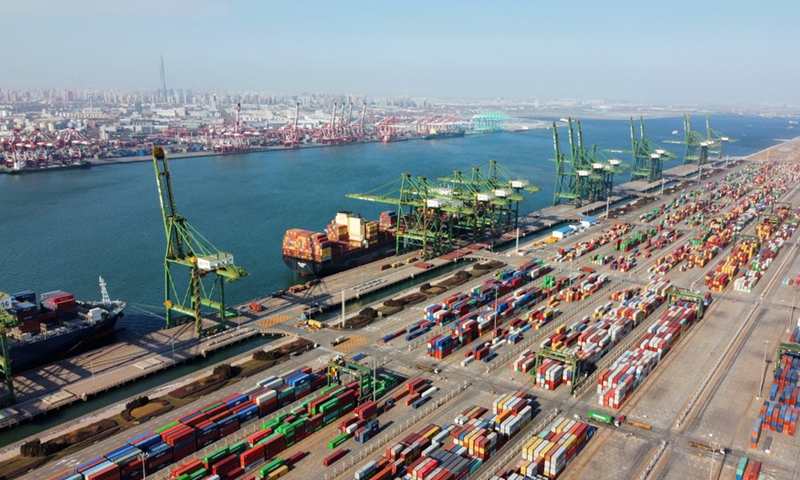
Aerial photo taken on Jan. 11, 2021 shows a view of the Pacific international container terminal at the Tianjin Port of north China's Tianjin Municipality.(Photo: Xinhua)
China's foreign trade performance came off to a brisk start this year, with its imports and exports surging 32.2 percent in the first two months. Among the resurgence of its exports, the shipments to Australia jumped 57.2 percent year-on-year, and the reasons behind deserve serious reflection by Australian policy-makers who have been ignorantly undermining bilateral relations with its largest trading partner.
Why has China recorded an overall export jump of 50.1 percent in the first two months, and an even higher export increase to Australia? The reasons primarily include the emerging recovery of major economies around the world, as well as lower previous data due to the sudden onslaught of the novel coronavirus last year.
As for China's exports to Australia, the higher-than-average trade data deserves more analysis against the backdrop of Canberra's ill-conceived China policy, which inevitably has its impact extended to economic and trade areas.
On one hand, it has revealed that there are positive and resilient elements among China-Australia ties, in spite of Canberra's deliberate obstruction. And China's exports to Australia, led by mechanical and electronic products, are difficult to replace.
As a leading manufacturing power in the world, China has become a key exporter of mechanical and electronic products. In the first two months of the year, China's exports in the single sector surged 54.1 percent year-on-year, with a total value of 1.85 trillion yuan ($285 billion). It is nearly impossible for Canberra to find an alternative supplier as large as China in the world.
China and Australia have seen their relations cooling down for a protracted period of time, with spreading negative impacts on economic and trade cooperation.
Now, a good number of Chinese consumers shun Australian-made products and services and Canberra's political reputation is plunging among most Chinese people, which certainly raise concerns over future cooperation with Australia among Chinese businesses and investors.
Under a 3.3 percent growth of China's outbound investment last year, the part to Australia recorded a drastic plummet, or more than 60 percent and reaching a six-year low. The underlying causes are clear and straight as Canberra has been holding a discriminatory attitude towards Chinese businesses, and repeatedly heightening scrutiny over investment projects proposed by Chinese companies.
Australia is a largely trade-centric economy, with China remaining its largest trading partner, export destination and source of imports for years. However, major goods of Australia being shipped to China are mineral resources and agricultural products, with relatively high substitutability. Compared to the overall 14.5-percent growth of China's imports in the first two months, purchases from Australia only recorded a 1.2-percent increase, much lower than the average level.
There's no denying that many Australian industries and exporters have taken a blow during Morrison administration's reckless obstructions of bilateral relations. But trying to pull political stunts and blame China for the setbacks is not the right choice for Canberra.
The two nations, in fact, enjoy a sound foundation for economic and trade exchanges which would greatly benefit both economies and their people. It is hoped that the policy-makers in Australia will seriously reflect on the positive elements in the ties with its largest trading partner, and do more to enhance trust and facilitate cooperation in the spirit of China-Australia comprehensive strategic partnership, on which a fruitful commercial relations is based.




